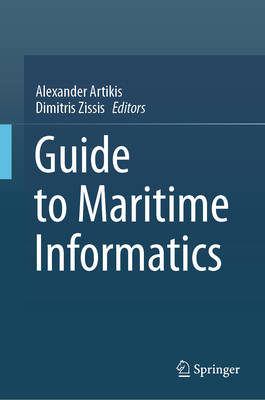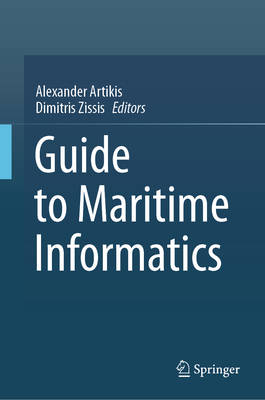
- Retrait gratuit dans votre magasin Club
- 7.000.000 titres dans notre catalogue
- Payer en toute sécurité
- Toujours un magasin près de chez vous
- Retrait gratuit dans votre magasin Club
- 7.000.0000 titres dans notre catalogue
- Payer en toute sécurité
- Toujours un magasin près de chez vous
Guide to Maritime Informatics
Livre relié | Anglais
94,95 €
+ 189 points
Description
In the last 25 years, information systems have had a disruptive effect on society and business. Up until recently though, the majority of passengers and goods were transported by sea in many ways similar to the way they were at the turn of the previous century. Gradually, advanced information technologies are being introduced, in an attempt to make shipping safer, greener, more efficient, and transparent. The emerging field of Maritime Informatics studies the application of information technology and information systems to maritime transportation.
Maritime Informatics can be considered as both a field of study and domain of application. As an application domain, it is the outlet of innovations originating from data science and artificial intelligence; as a field of study, it is positioned between computer science and marine engineering. This new field's complexity lies within this duality because it is faced with disciplinary barriers yet demands a systemic, transdisciplinary approach. At present, there is a growing body of knowledge that remains undocumented in a single source or textbook designed to assist students and practitioners.
This highly useful textbook/reference starts by introducing required knowledge, algorithmic approaches, and technical details, before presenting real-world applications. The aim is to present interested audiences with an overview of the main technological innovations having a disruptive effect on the maritime industry, as well as to discuss principal ideas, methods of operation and applications, and future developments. The material in this unique volume provides requisite core knowledge for undergraduate or postgraduate students, employing an analytical approach with numerous real-world examples and case studies.
Maritime Informatics can be considered as both a field of study and domain of application. As an application domain, it is the outlet of innovations originating from data science and artificial intelligence; as a field of study, it is positioned between computer science and marine engineering. This new field's complexity lies within this duality because it is faced with disciplinary barriers yet demands a systemic, transdisciplinary approach. At present, there is a growing body of knowledge that remains undocumented in a single source or textbook designed to assist students and practitioners.
This highly useful textbook/reference starts by introducing required knowledge, algorithmic approaches, and technical details, before presenting real-world applications. The aim is to present interested audiences with an overview of the main technological innovations having a disruptive effect on the maritime industry, as well as to discuss principal ideas, methods of operation and applications, and future developments. The material in this unique volume provides requisite core knowledge for undergraduate or postgraduate students, employing an analytical approach with numerous real-world examples and case studies.
Spécifications
Parties prenantes
- Editeur:
Contenu
- Nombre de pages :
- 333
- Langue:
- Anglais
Caractéristiques
- EAN:
- 9783030618513
- Date de parution :
- 09-02-21
- Format:
- Livre relié
- Format numérique:
- Genaaid
- Dimensions :
- 196 mm x 239 mm
- Poids :
- 589 g

Les avis
Nous publions uniquement les avis qui respectent les conditions requises. Consultez nos conditions pour les avis.





